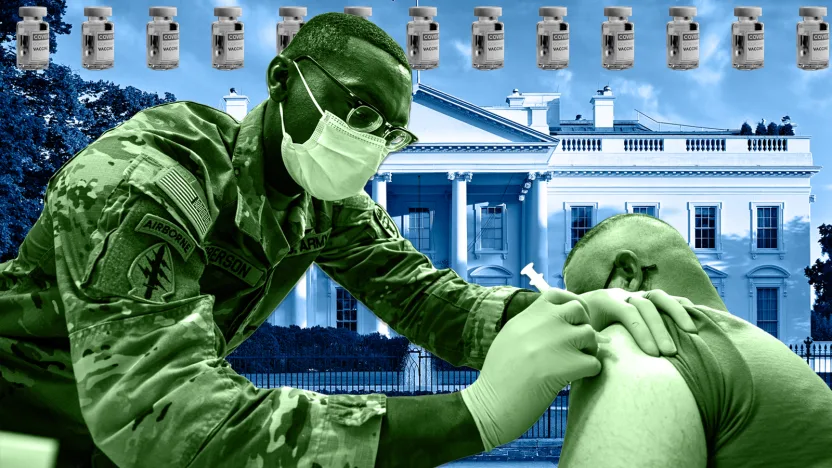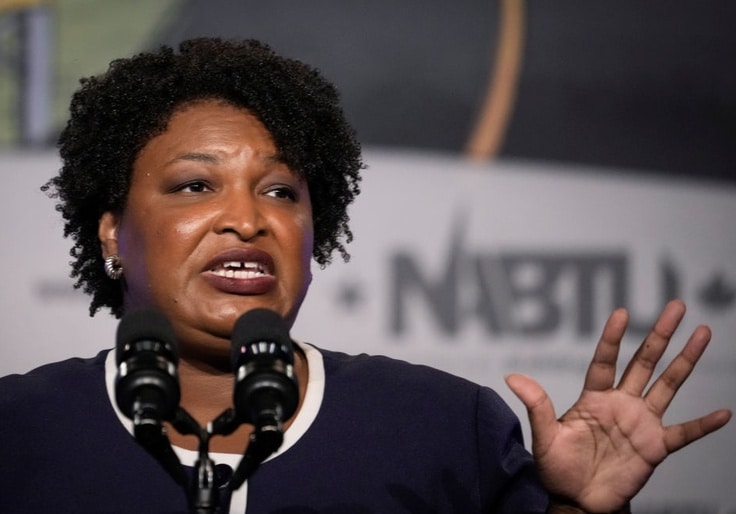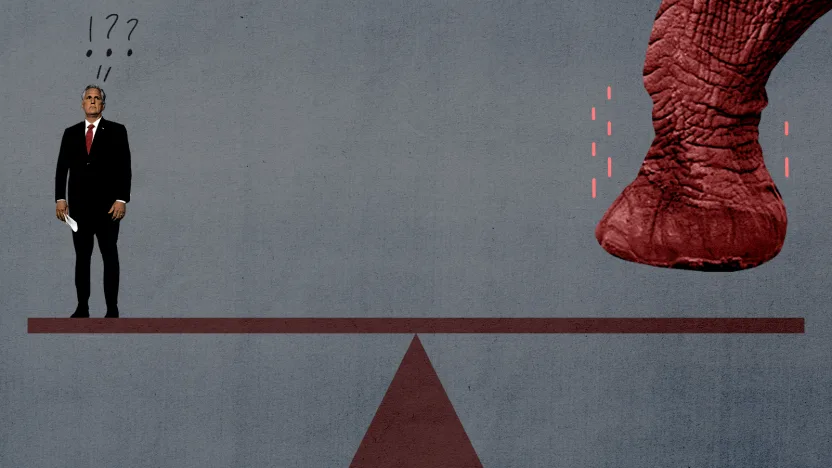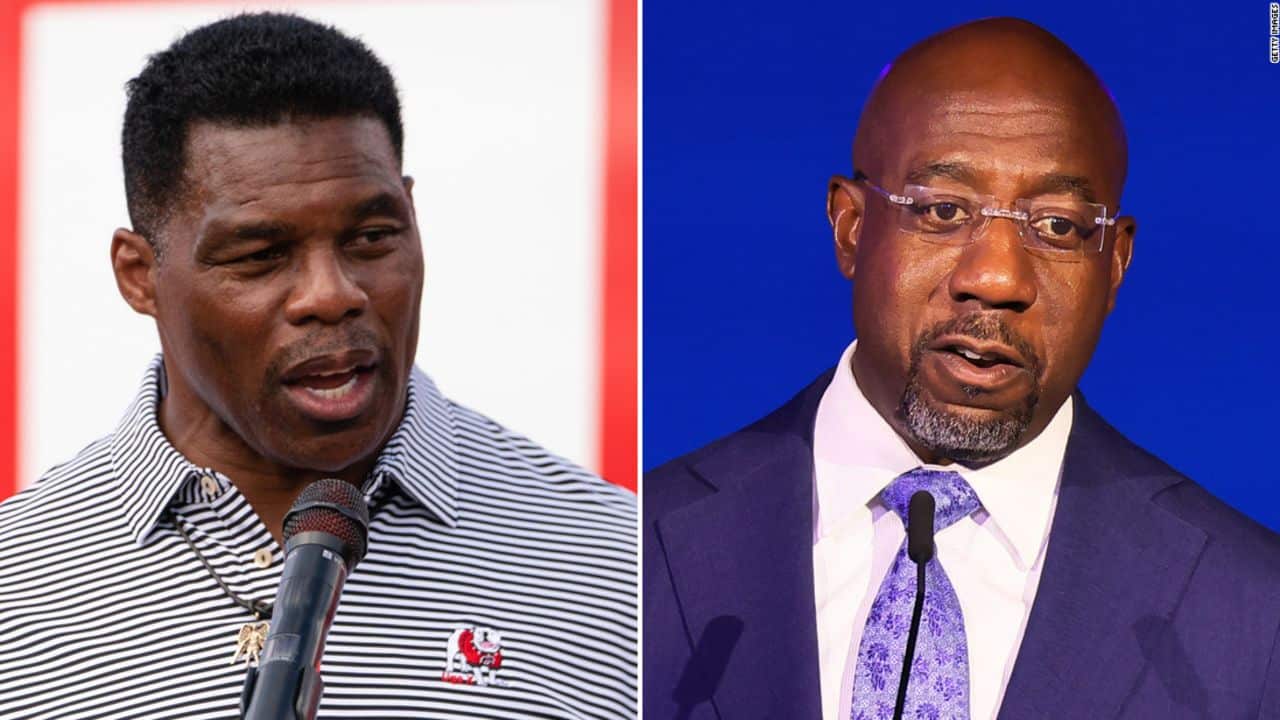Why is everyone in Washington talking about military COVID vaccine mandates again?

As the United States stands at the precipice of yet another COVID winter, lawmakers and military leaders in Washington are bracing for a different, albeit related, resurgence of their own as conservatives make yet another push to rescind the Defense Department’s standing vaccine mandate for members of the armed forces.
While mandatory COVID inoculations have long been a bugbear for the political right in general, the Pentagon’s decision to require COVID vaccines has become a particular area of focus for Republicans — some of whom used the issue as a midterm election campaign promise. With their narrow, incoming House majority, that GOP promise to roll back the DoD’s vaccine mandate appears poised to become a reality, even as COVID cases have seen a sharp uptick in recent weeks. Here’s everything you need to know:
Why now?
For the first time since the Biden administration ordered the mandate in place for all military personnel, Republicans are finally in a legislative position to do something about what some in the party have deemed a “national security risk” that’s contributed to low recruitment numbers and has resulted in the dismissal of thousands of service members who have refused the shot.
In part, this is thanks to the looming budget deadline, and the need to pass the next Defense Authorization bill to fund the Pentagon for the coming year. A number of high-profile Senate Republicans have vowed not to let the bill move forward unless Democrats drop the mandate from the legislation, while House Minitory Leader and aspiring Speaker Rep. Kevin McCarthy (R-Calif.) made a similar promise to Fox News host Maria Bartiromo, calling it “the first victory of having a Republican majority.” And as Democrats scramble to pass priority legislation before losing control of one of the chambers of Congress, any delay in major legislation could throw their plans into disarray with time running out.
The already fraught sentiment among conservatives over the military mandate was heightened recently by claims that the U.S. Naval Academy in Annapolis, Maryland, had barred a pending graduate from receiving their diploma for refusing the COVID vaccine. Speaking with Fox News on Dec. 1, Rep. Glenn Steube (R-Fla.) exclaimed “about spending four years of your life in college and then not even being able to get a degree for the work that you’ve done.” In a statement to the National Review, the Naval Academy denied the allegation, saying “there have been no midshipmen separated from the United States Naval Academy, nor denied a commission, for declining the COVID-19 vaccine,” adding that a “handful” had requested religious exemptions.
While Republicans may be the ones pushing hardest to repeal the mandate, some congressional Democrats have signaled an openness to the plan. “I was a very strong supporter of the vaccine mandate when we did it, a very strong supporter of the COVID restrictions put in place by DoD and others,” Rep. Adam Smith (D-Wash.), chair of the House Armed Services Committee, told Politico recently.
“But,” he added, “at this point in time, does it make sense to have that policy from August 2021? That is a discussion that I am open to and that we’re having.”
What does the military say?
Despite the rancorous opposition from Republicans, Defense Secretary Lloyd Austin appeared firmly committed to keeping the mandate in place, telling reporters recently that “a million people died [of COVID-19] in the United States of America. We lost hundreds in DOD. So this mandate has kept people healthy.”
“I support continuation of vaccinating the troops,” he added.
Marine Corps Commandant Gen. David Berger voiced similar support for the mandate at a recent Reagan National Defense Forum, where he noted that the suite of existing vaccine requirements are “what you need to maintain a healthy unit that can deploy on ship, ashore, it doesn’t matter.”
But, Berger admitted, the mandated vaccines have had a deleterious effect on military recruitment. “In parts of the country there’s still myths and misbeliefs about the back story behind it,” he said, adding later that “there was not accurate information out early on and it was very politicized and people make decisions and they still have those same beliefs.” As Politico has noted, however, the downturn in recruitment is likely a confluence of multiple factors, including shrinking eligibility, a strong job market, and rising obesity rates.
Meanwhile, some in the military argue that the costs of the mandate have simply begun outweighing the benefits. “While the Pentagon suggests that military readiness is at risk with anything less than ‘maximum vaccination,’ it’s vital that we consider the real consequences of enforcing its mandate,” Florida National Guard Commander Maj. Gen. James Eifert wrote in an opinion essay for The Wall Street Journal over the summer. “My Florida National Guard formations face the potential loss of about 1,000 unvaccinated guardsmen out of 12,000 total airmen and soldiers. That leaves us shorthanded as our state enters hurricane season, while more than 1,000 soldiers and airmen are also deployed on federal missions around the world.”
Where does the White House stand?
Officially, the White House remains committed to maintaining the vaccine mandate, National Security spokesman John Kirmy announced shortly after Rep. McCarthy insinuated that he’d convinced President Biden to reverse course on the issue. The White House has simply called their discussions “ongoing.”
“He continues to believe that all Americans, including those in the armed forces, should be vaccinated and boosted for COVID-19,” Kirby said during a press briefing.
Stacey Abrams’s Georgia Nonprofit Could Face Criminal Investigations for Unlicensed Fundraising

This post was originally published on this site Stacey Abrams’s New Georgia Project is collecting donations without a license in at least nine states, opening itself up to fines and criminal inquiries, a Washington Free Beacon investigation found. State laws across the country prohibit charities that have not filed required financial disclosures with the IRS […]
Pfizer seeks FDA authorization for omicron vaccine in kids under 5

This post was originally published on this sitePfizer and its German partner BioNTech have submitted an application asking the Food and Drug Administration for emergency use authorization of their omicron-adapted bivalent COVID-19 vaccine as the third shot in a three-dose series for children ages 6 months through 4 years, the companies announced Monday. If authorized, […]
Oil Price Rises After Russia Cap Kicks In
This post was originally published on this siteThe West imposed sanctions on Russian crude, pitching the energy conflict with Moscow into an unpredictable new phase that could inject further volatility into global oil markets.
Railroads Focus on Stabilizing Workforce After Strike Is Averted
This post was originally published on this siteThe federal rail regulator and businesses criticize service disruptions. Norfolk Southern is rethinking how it handles furloughs.
Paul Whelan calls home from Russia after more than a week without contact

Paul Whelan, an American detained in Russia, was able to call home Friday after more than a week without contact with his family, his brother David said.
Lawsuit claims legislation used to fund DeSantis’ migrant flights is unconstitutional

Three non-profit immigrant rights organizations have filed a lawsuit in the Southern District of Florida against Republican Gov. Ron DeSantis and Florida Transportation Secretary Jared Perdue, claiming that the state is “infringing upon the federal government’s immigration system by creating a separate, parallel immigration system.”
November Employment Report Will Update on Tightness of U.S. Labor Market
This post was originally published on this siteThe job market has remained resilient this year, with employers still seeking to hire despite an uncertain economic outlook and elevated recession fears.
With Kevin McCarthy’s speaker bid on the line, here’s who to watch

With just weeks to go before the start of the next legislative session, one of the largest open-ended questions facing the incoming GOP House majority is: who will ultimately lead the party as the next Speaker of the House? As minority leader, California Republican Rep. Kevin McCarthy seemed poised to step into the role for the coming term. However, frustrations within the party over its lackluster showing in the 2022 midterms coupled with a broader pull rightward from the GOP’s MAGA and Freedom Caucus members have placed McCarthy’s path to the speakership in serious peril. Though he has managed to secure his party’s official backing for the role, the GOP’s razor-thin congressional majority means that any defections in the upcoming full House vote could be fatal for McCarthy’s chances for the speakership — and potentially his future in the party at all.
As the clock ticks down to the Jan. 3 vote, this is where the key players stand on whether Kevin McCarthy should be the next Speaker of the House.
Who’s against?
At maximum, Republicans will have a 222-213 House majority — one of the narrowest in decades. Assuming zero Democrats back him, this affords McCarthy just four defections from his own caucus before his speaker’s bid is scuttled. Crucially, those defections must come in the form of an overt vote against him, and cannot simply be representatives who vote “present” or who are absent from the vote.
Rep. Andy Biggs (R-Ariz.), who led an unsuccessful attempt to wrest the GOP speaker’s nomination from McCarthy in mid-November, has already committed to voting against McCarthy, telling the press he would vote “Biggs” instead. As reported by The Hill, Biggs is the third Republican congressman to publicly commit to voting for a concrete alternative, joining Reps. Bob Good (R-Va.) and Ralph Norman (R-S.C.) in their opposition to McCarthy. Speaking with Axios, Good confirmed he would be voting for Biggs.
Rep. Matt Gaetz (R-Fla) has also committed to voting against McCarthy, although he has not clarified whether that “no” would come in the form of a “present” vote, or by actually naming an alternative.
All told, Biggs has claimed as many as 20 GOP congressmen and women are “pretty hard no’s” on McCarthy’s speaker bid.
Who’s wavering?
In a sign of the tension between the party’s anty-McCarthy wing, and the fear that a contested leadership fight would force any Republican hoping to grasp the speaker’s gavel to cross the aisle — and make concessions to Democrats — to lock in a full House majority, consider Rep. Matt Rosendale (R-Mont.). A member of the far-right Freedom Caucus that’s been the party’s bastion of anti-McCarthy sentiment of late, Rosendale has repeatedly stressed that he is both deeply opposed to McCarthy as speaker, and will not vote “present” come January 3. However, Rosendale has also publicly stated multiple times that he would cast a ballot for McCarthy under “extreme circumstances.”
Conversely, Rep. Don Bacon (R-Ne.) has signaled his willingness to address Rosendale’s nightmare scenario head-on, telling reporters in mid-November that “If we have total gridlock [in the Speakers race], I’m going to work with like-minded people across the aisle to find someone agreeable for speaker. We have to govern. We can’t afford to let our country be stuck in neutral.”
Who’s staying quiet?
Put simply: a lot of people. As compiled by The Washington Post, a number of high-profile GOP lawmakers — including members of the party’s far-right flank — have declined to commit to voting for, or against, McCarthy. House Freedom Caucus Chair Scott Perry (R-Pa.) told The Hill that “I’m not making my position known. I do have an open mind, but I also see what’s happening.” Fellow Freedom Caucus members Chip Roy (R-Texas) and Clay Higgins (R-La.) have similarly demurred from publicly stating if they’d back McCarthy, or push for new leadership.
Who’s backing him?
Despite the high-profile defections and public denunciations from his GOP colleagues, McCarthy does still enjoy sizeable support from a number of significant Republican lawmakers and power brokers. Having won the party’s Speaker’s nomination 188-31, he remains the leading contender for the role. Chief among his public backers is Rep. Marjorie Taylor Greene (R-Ga.) who has bucked the trend of many of her fellow Freedom Caucus colleagues to not only support McCarthy, but urge the rest of the party to do so as well. Calling any leadership challenges “bad strategy” given the GOP’s narrow majority during an interview with Steve Bannon, Greene said party disarray could “open the door and allow Liz Cheney, possibly, to become Speaker.”
Incoming House Majority Leader and current Minority Whip Steve Scalise (R-La.) has also thrown his weight behind McCarthy’s bid, closing the door on mounting his own challenge for the position. “Whip Scalise’s focus remains on moving our conservative agenda forward and maintaining our Republican majority,” Scalise spokesperson Chris Bond told Politico in early November. “When a Speaker’s race is called, he’ll be supporting Leader McCarthy.”
Perhaps most crucially, however, is the support coming from the party’s undeniable center of gravity: former president and current candidate for the GOP’s 2024 nomination, Donald Trump, who endorsed McCarthy as speaker on the eve of the 2022 midterms. While Trump’s endorsements have been mercurial and fleeting in the past he has, as of yet, not shifted his position on wanting McCarthy to have the gavel in the coming legislative term.
Early voting surges in Georgia as Walker and Warnock make their final pitches to swing voters

The compressed timeframe of Georgia’s Senate runoff has juiced single-day turnout across the state, which has now broken early voting records on two consecutive days, a top Georgia election official said, as the race between Democratic Sen. Raphael Warnock and Republican Herschel Walker enters the homestretch.
Tagged georgiaherschel walkerMidterms 2022Raphael Warnockrunoff election